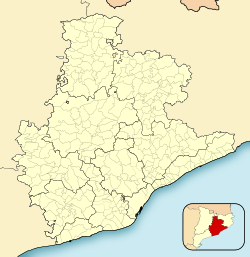Caldes de Montbui | |
|---|---|
 | |
| Coordinates: 41°37′45″N 2°10′10″E / 41.62917°N 2.16944°E | |
| Country | |
| Community | |
| Province | Barcelona |
| Comarca | Vallès Oriental |
| Government | |
| • Mayor | Isidre Pineda i Moncusí (2019) |
| Area | |
| • Total | 37.4 km2 (14.4 sq mi) |
| Elevation | 203 m (666 ft) |
| Population (2018)[2] | |
| • Total | 17,449 |
| • Density | 470/km2 (1,200/sq mi) |
| Demonym(s) | Montbuienc, montbuienca Calderí, calderina |
| Website | www |
Caldes de Montbui (Catalan pronunciation: [ˈkaldəz ðə mumˈbuj]) is a Spanish town and municipality in the comarca[1] of the Vallès Oriental in Catalonia. It is situated in the upper valley of the Caldes river, and the highest point of the municipality is the peak of el Farell at 816 m. It lies about 30 km from Barcelona and it part of its metropolitan area.

The hot springs have been exploited since Roman times, and the remnants of the Roman baths and other Roman buildings can still be seen. The source of la Font del Lleó ("Lion Springs") in the main square emerges at more than 70 °C (158 °F). The town conserves parts of its medieval fortifications and the Torre de la Presó (prison). The hermitage of la Mare de Déu del Remei dates from the sixteenth century, as does the church of Santa Maria with its baroque entrance. The roman church of Sant Sebastià de Montmajor, in the village of the same name at the extreme north-west of the municipality, is particularly well preserved.
The artist Manolo Hugué lived and worked in Caldes de Montbui, and his house has been converted into a museum displaying both his works and those of other artists. The town also has an archeological museum and the Delger museum of furniture, paintings and sculptures.
Continuing in this artistic tradition is the master landscape painter Ramon Vilanova, a native son of the city and lifetime resident.
- ^ "El municipi en xifres: Caldes de Montbui". Statistical Institute of Catalonia. Retrieved 2015-11-23.
- ^ Municipal Register of Spain 2018. National Statistics Institute.



